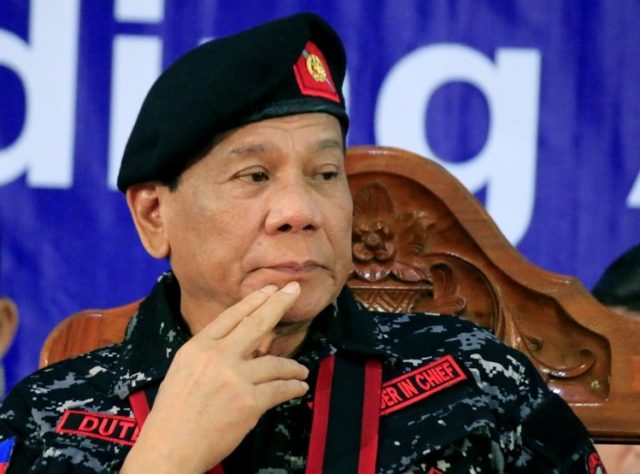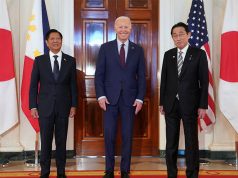(UPDATE 8 – 5:57 p.m.) MANILA, Philippines – Malacañang announced Wednesday that the Philippines would withdraw its ratification of the Rome Statute, the treaty that established the International Criminal Court, which last month launched its crime against humanity investigation on President Rodrigo Duterte’s war on drugs.
The Palace, through presidential chief legal counsel Salvador Panelo, furnished journalists copies of Duterte’s statement saying, “I therefore declare and forthwith give notice, as the President of the Republic of the Philippines, that the Philippines is withdrawing its ratification of the Rome Statute effective immediately.
In the same statement, the chief executive said that it appeared that there was a “concerted effort” between the United Nations special rapporteurs and the ICC special prosecutor to depict him as a “ruthless and heartless violator of human rights who allegedly caused thousands of extrajudicial killings.”
Duterte said this was nothing but “baseless, unprecedented and outrageous attacks on my person as against my administration, engineered by the officials of the United Nations, as well as the attempt by the [ICC] special prosecutor to place my person within the jurisdiction of the [ICC].”
ICC probe of Duterte war on drugs can’t be stopped by treaty withdrawal
But while the Duterte administration is in a hurry to get out of the treaty that was ratified via the Philippine Senate’s concurrence on August 23, 2011, the process of withdrawing takes time.
And even when the Philippines is finally out of the ICC, the statute’s rules mandate the court to still continue hearing the case that was filed against a state’s citizen.
As simplified by The Netherlands-based international organization Justice Hub, the following are the steps that a state has to take to withdraw from the treaty based on Article 127 of the Rome Statute:
1. The state will have to write the UN secretary general informing him about the intention to withdraw from the treaty.
2. The state must hand its letter or notification in.
3. After handing the letter, the state must wait for a year for the withdrawal to take effect.
4. After a year, the state will no longer be part of the parties to the treaty and will be out of the ICC. However, the state still has to pay fees that it may owe and any cases involving the citizens of that state will continue.
The provisions in Article 127 of the statute specifically state that:
1. “A State Party may, by written notification addressed to the Secretary General of the United Nations, withdraw from this Statute. The withdrawal shall take effect one year after the date of receipt of the notification, unless the notification specifies a later date.”
2. “A State shall not be discharged, by reason of its withdrawal, from the obligations arising from this Statute while it was a Party to the Statute, including any financial obligations which may have accrued.”
3. “Its (the state’s) withdrawal shall not affect any cooperation with the Court in connection with criminal investigations and proceedings in relation to which the withdrawing State had a duty to cooperate and which were commenced prior to the date on which the withdrawal became effective, nor shall it prejudice in any way the continued consideration of any matter which was already under consideration by the Court prior to the date on which the withdrawal became effective.”
Senate Minority Leader Franklin Drilon said the Philippines’ withdrawal from the treaty would not have any effect on the case against Duterte that was filed at the ICC before the move to leave the accord.
He said that as stated in Article 127, even if the withdrawal from the treaty takes effect, this does not tie ICC’s hands from continuing its inquiry on Duterte’s anti-narcotics campaign.
“That is the rule. The ruling as to the continuation of the investigation will be ruled upon by the court itself. I’m sure the government will assert that it is no longer bound by the statutes. That is a legal issue which will now be resolved by the court,” said Drilon.
Burundi withdrew but ICC probe continued
What happened to Burundi, the first nation to leave the ICC, is a case in point.
Despite the African country’s withdrawal from the treaty that took effect on October 27, 2017, the ICC maintained that it would still “exercise its jurisdiction over crimes listed in the Rome Statute committed on the territory of Burundi or by its nationals from 1 December 2004 to 26 October 2017.”
The alleged crimes that the ICC was referring to allegedly involved state agents and groups implementing state policies with members of the Imbonerakure through purportedly launching a widespread and systematic attack against the Burundian civilian population.
The attack allegedly targeted those who opposed or were perceived to oppose the ruling party after the announcement, in April 2015, that President Pierre Nkurunziza was going to run for a third term in office.
The following crimes against humanity were allegedly committed both in and outside of Burundi by Burundian nationals, between 26 April 2015 and 26 October 2017:
-murder and attempted murder
-imprisonment or severe deprivation of liberty
-torture
-rape
-enforced disappearance
-persecution
On October 25 2017, two days before Burundi’s withdrawal from the treaty took effect, the ICC gave its prosecutors the green light to investigate alleged war crimes committed by the Burundi government against the country’s political opposition between April 2015 and October 2017.
In a statement, ICC judges said there was “a reasonable basis to proceed with an investigation in relation to crimes against humanity,” that included murder, rape and torture that led to the deaths of more than 1,000 people and prompted 400,000 to flee the country.
Only the state can withdraw from the treaty
Also, according to Drilon, former secretary of the Department of Justice, while the Philippines was able to accede to the Rome Statute via the Senate’s concurrence, the upper chamber has no right to interfere with the administration’s move to withdraw from the treaty.
As stated in the treaty’s rules, only a state — not a parliament or a political party — can withdraw from the ICC.
Doctrine of transformation
Meanwhile, human rights lawyer Rommel Bagares dismissed Duterte’s claim that the Rome Statute is ineffective and unenforceable because it was not published in a newspaper of general circulation as provided for in the Civil Code.
“He’s a lawyer so I suppose he’s heard of the doctrine of transformation — a treaty becomes effective and part of Philippine law upon concurrence by the Senate, under the treaty clause of the 1987 Constitution,” Bagares said.
“Moreover, we already have its implementing legislation — the IHL (International Humanitarian Law) Act, or R.A. 9851,” he said.
Also, Bagares said Article 14 of the Civil Code itself states that, “Penal laws and those of public security and safety shall be obligatory upon all who live or sojourn in the Philippine territory, subject to the principles of public international law and to treaty stipulations.”
“So even the Civil Code recognizes the binding nature of treaties pertaining to penal laws (as the Rome Statute deals with International Criminal Law) to which we are a party.”
Duterte’s move ‘utterly self-serving’
At the House of Representatives, lawmakers critical of the administration claimed that Duterte’s alleged fear of the ICC probe made him decide for the Philippines to withdraw from the Rome Statute.
ACT partylist Rep. Antonio Tinio said the President’s announcement was “utterly self-serving and driven by sheer panic at the prospect of a trial before the International Criminal Court for crimes against humanity related to his murderous war on drugs.”
“Saving his own skin has taken precedence over the long-term international commitment made by the Philippine State to human rights and against impunity when it became a party to the Rome Statute,” he said.
However, Tinio, also citing Article 127 of the statute, said that “whether he (Duterte) likes it or not, he will be held accountable.”
Bayan Muna Rep. Carlos Zarate warned that Duterte’s withdrawal from the accord would be a “grave setback to human rights and accountability.”
“President Duterte’s withdrawal from the Rome statute is intended to escape accountability by present and even future officials for crimes committed against the people and humanity. This is ominous of an even worse human rights situation in the country,” he said.
“For all the bluster of the present administration in the manner it launched its bloody wars, this withdrawal also means that it is gravely petrified of the long arm of the law and accountability,” he added.
‘Afraid to face scrutiny’
Akbayan Rep. Tom Villarin said the President “is afraid to face scrutiny by the international criminal court for which he earlier bragged to face head on.”
“If these are baseless, unprecedented and outrageous attacks, then the right tact is to face it as a statesman with head hold high and without fear if indeed no misdeed happened,” he said.
Ifugao Rep. Teddy Baguilat Jr. said Duterte had no reason to fear about being investigated by the ICC if he was convinced that there were no human rights violations committed in the implementation of his administration’a war on drugs.
Gascon says Duterte move a ‘reversal, encouraging impunity to continue’
At the Commission on Human Rights (CHR), the agency’s chairman Jose Luis Martin “Chito” Gascon said the “decision to withdraw from the ICC is an unfortunate move that constitutes a significant setback to the decades-long global effort of universal jurisdiction to ensure accountability for the most serious violations of human rights law.
According to the CHR chief, the Philippines “has historically been at the forefront of advancing international justice” and Duterte’s move “constitutes a reversal that will be viewed as encouraging impunity to continue.”
“The government must show good faith by fully cooperating with ICC processes including the current preliminary examination, which can not be terminated by this withdrawal,” said Gascon.
“The government is grossly mistaken in believing that the ICC does not have jurisdiction over events in this country. What it must do is to show that it is willing and able to bring all perpetrators of human rights violations to justice,” he added.










